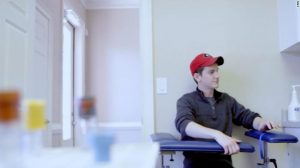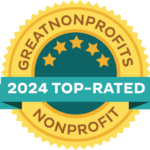Author: Ryan Prior
Every morning, I shave, brush my teeth, and swallow a dozen pills. I look in the mirror and thank God I can even walk out the door. Since 2007, I’ve lived with an incurable disease known as chronic fatigue syndrome. Internationally, doctors call it myalgic encephalomyelitis, or ME / CFS. The tongue-twister means “painful inflammation of the brain and nervous system.”
The grassroots ME Action Network recognizes August 8 as “Severe ME Awareness Day.” You may be surprised how many people in your life are, like me, struggling in silence with an invisible burden. The Centers for Disease Control and Prevention estimates up to 2.5 million Americans are suffering from ME / CFS, with many cases undiagnosed.
I’m even more grateful for the life I have, knowing how this disease could have taken me down a darker road. So today, I lend my voice to those who suffer from one of the most debilitating diseases many people have never heard of.

No time to be sick
The real story of my life began when I was 16, busy constructing a resume I hoped would lead to Princeton or West Point.
I had just completed a summer abroad studying writing and philosophy at Oxford. I became an Eagle Scout, student council president and a captain of my school’s cross country team. I was loaded up with Advanced Placement courses and I was a member of a student team working with NASA engineers.
I didn’t have time to be sick.
But one day after school, I came home and slept for 16 hours straight. I did that each day for two weeks, until I realized it would be impossible to go to school at all anymore.
My body felt like dead weight. I had flu-like symptoms, severe headaches, and my brain felt so foggy it was impossible to read more than a couple of sentences.
Through my high school’s “hospital housebound program,” three teachers filled out the rest of my academic year with house calls to instruct me and administer tests, sometimes at my bedside.
For six grueling months, I didn’t know what was wrong. It took visits to 16 doctors from a litany of specializations to finally identify the illness stealing my life.
But among ME / CFS patients, I consider myself lucky. Twenty-five percent of patients spend their lives bedridden. Some become so sensitive to light that they must live in darkness. Many lose the ability to eat solid food or to speak. One patient told me that simply taking a shower feels like running a marathon.
‘The bad news is you’re not going to die’
Currently there is no FDA-approved drug to treat ME / CFS, a problem that devastates patients as much as it frustrates physicians. Before I was diagnosed, I remember lying on a rheumatologist’s table too sick to sit up for more than 20 minutes.
I recall her saying, “You’re clearly very sick, and I’m determined to figure out what it is. It could be chronic fatigue syndrome, but if I diagnose you with that, that means there’s nothing we can do.”
I could tell she cared. Ironically, in this case caring meant not naming my disease because that would be tantamount to giving up.
When I was too ill to attend school, I desperately researched how I might pick up the shards of my shattered life. Online there were stories of those who spent decades disabled or bedridden, caught in a shadow of what their lives ought to have been. One book I read on the disease had a morbid joke: “The good news is you’re not going to die. The bad news is you’re not going to die.”
For me, that joke was a searing prophesy of my life to come if I didn’t somehow pull together a solution. I had dreamed of writing Pulitzer Prize-winning stories or being elected to Congress, not spending my life in a darkened room, cared for by a nurse.
Finding hope
There are only one or two dozen ME / CFS specialists in the United States. A year and a half after I first got sick, I found one of them. Her office was two hours away and wouldn’t take our insurance, but I persuaded my parents to take me.
A decade later, I still see that doctor. I have to take 20 pills a day, give myself a weekly shot, and get an IV infusion every month. It can still be tough, but I can work and travel, play sports and see my friends.
My daily conversations with other patients remind me how far I could still fall back.
Many of the treatments that work for me are often out of reach for most patients, geographically and financially. And for those who can access the treatments, many are too ill or have been sick too long for them to work.
Despite the hardships, there are beacons of hope, with world-class scientists searching for bio-markers and new treatments.
The Open Medicine Foundation coordinates an ME / CFS research partnership at Stanford and Harvard.
You can support their ongoing studies through online donations. With continued support, they might one day find a cure that works for all ME / CFS sufferers.
If you know someone with this disease, or a similar issue, please lend a hand. Go visit them if they’re too sick to go out. Bring them groceries, because even getting basic necessities can be a mighty struggle.
And most of all, please just listen, for they are far more lonely and isolated than you may realize.
My family and friends have saved me more times than they will ever know, just by being there.
Permission to share article granted by the author. Original publication can be seen here.


